William MacEwan (sometimes spelled McEwan) was one of the first Gospel recording artists in the world, recording for Columbia Records in November 1911. Glasgow-born, he became a superstar in America, and sold a colossal 250,000 copies of The Old Rugged Cross in Britain alone. He has no known biography. This blog is an attempt to piece his remarkable story together.
..............
Please Note: the content of this blog is currently undergoing an editing process, in both content and presentation. The dates for the recording sessions are from the late Frank Wappat’s work, who proposed that MacEwan’s famous first London recording session was in November 1911, with 82 recordings. However my friend Stuart Eydmann of www.raretunes.org recently directed me towards another respected discographer who proposes different dates for MacEwan's sessions, beginning c. December 1904, with 120 recordings.Regards, Mark Thompson, January 2016.
……….....
BACK IN THE EARLY 1990s during my student days at the Art College in Belfast, Northern Ireland, I did a fair bit of hoking in old second hand bookshops and junk shops around Smithfield Market and other places. This was at the tail end of 'The Troubles', but before the IRA ceasefire and therefore before the prosperity bubble of the late 90s/early 2000s. It was still fairly easy to find remnants of bygone days. The best shops are all now gone.
Digging through boxes and stacks of brittle old 78rpm records, one name appeared over and over again - William MacEwan. It seemed that nearly every charity shop had some of his records, discarded by people who had forgotten him, a once-household name who had been left behind by shifting tastes and the 'progress' of advances like the LP, the audio cassette and the CD.
Around this time an audio cassette triple box-set of all 82 of McEwan's known recordings was issued, on a limited-edition private release by the late Frank Wappat (1930–2014) of BBC North in Newcastle Upon Tyne, England. A few years later I learned that McEwan's recording of the Scots language piece My Ain Countree had been one of my late grandfather's favourite songs, it's words found among his personal effects after he died, written in my grandfather's handwriting on two pages of spiral-bound lined paper. I still have the pages. And the 78.
In 2007 a version of My Ain Countree appeared on Smithsonian Folkways CD Sound Neighbours, performed by the band my brother and I were then in, the Low Country Boys. We played it a few times at the Smithsonian Folklife Festival that year, but more importantly over the years Graeme and I have managed to bring it back to popular attention here at home, and in Scotland, re-introducing people to a slice of heritage that was almost lost.
Despite William MacEwan's obvious popularity and commercial success, I have never been able to find a definitive biography of him and so I had no idea of the sheer scale of his musical achievements. Throughout 2011 I gathered up as much information about him as I could find. These blog posts are my attempt to piece together something of his story and to give him his place back for our globally-connected digital generation, in the hope that this is of some help to others. These posts were originally published to coincide with the 100th anniversary of his first recording session, for Columbia Records in London, in November 1911.
This is the story of how a poor Glasgow boy, of Ayrshire parents and an Ireland-born grandfather, became one of the biggest musical names in the world.
Wednesday 6 January 2016
Introduction
Postscript on William MacEwan

(This post was published in February 2015)
BACK IN 2011 (to coincide with the 100th anniversary of his first recordings) I posted here a ten-part biography of the Glasgow-born singer William MacEwan (1871-1943). He came back into my head this week when I found the above advert, from Hartlepool on 13 Feb 1932. He last recording session was in London in March of that same year. I also found this online, confirming my own researches:
'... Good sales could not always be guaranteed, but Columbia scored an equally important success with its 1927 American recording of Scottish-born gospel singer William MacEwan's rendition of the hymn "The Old Rugged Cross" coupled with "Let's talk it over bye-and-bye" (Columbia 4148). By 1933 British sales of this record had exceeded 250,000, at a time when all but a handful of the most successful dance and popular music record enjoyed sales of 100,000 and most record companies considered sales in excess of 10,000 copies a "hit" ...' - source here.MacEwan's voice made The Old Rugged Cross world famous. By the year he died, 1943, it had sold a reported 20 million copies around the globe, both vinyl and sheet music.
Part Eleven: Epilogue
THIS SERIES OF BLOG POSTS is as far as I can take the story of William MacEwan. Others more skilled than I should feel free to get in touch with me if they want to use these blog postings as a basis for more detailed research. I would hope that some of William’s descendants might even have an archive of his diaries, newspaper clippings, family photographs and other artefacts which one day could be published to tell his story with more accuracy than I have been able to. If you are a descendant of his I would love to hear from you. However, if all of these things are long-dumped then I hope that this ten part series is a useful memorial for readers.
During my researches I have found another recording, unlisted in any of Frank Wappat's releases, so perhaps it was one of the originally unissued and unnamed tracks from December 1929 or February 1930. It is "He Hideth My Soul" (written by Co Tyrone born William James Kirkpatrick), Columbia issue number 81511. Listen to it here, and to MacEwan rolling his "r"s in good Scots style:
• He Hideth My Soul (click the black arrow to download to your computer)
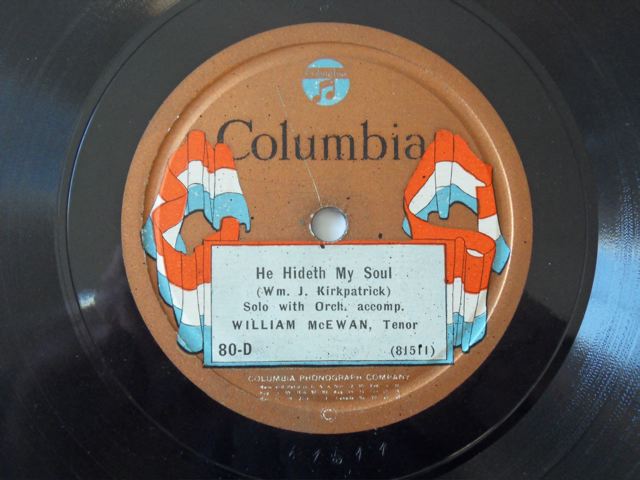
For me the story is personal, in that William MacEwan’s records were part of everyday life here in Northern Ireland, among the evangelical Protestant communities that I, my parents and my grandparents grew up in and are still part of. He did more than any other to give ordinary folk the ability to have recorded gospel music in their homes in the era when the gramophone was cutting-edge technology, and established a whole new collection of hymns in the hearts of the people, many of which are still sung today. The songs he recorded, whilst classics to us nowadays, were modern and contemporary for his times. It is a shame that his recordings are now so hard to find, all out of circulation and unavailable to be bought and enjoyed.
Many Scottish evangelists and gospel singers have had a close relationship with the Ulster-Scots folk of Northern Ireland over the generations. There are many more whose lives deserve to be remembered today. Perhaps there are a few other projects like this one which will emerge in future years.
Meanwhile, with Christmas coming, here are two of William MacEwan’s Christmas recordings for you to enjoy, from his London recordings of August 1927.
• Angels Song (labeled “a Christmas number" - click the black arrow to download to your computer)
(words and music by Robert Lowry, whose parents were from Killinchy in Co Down; date of publication unknown)
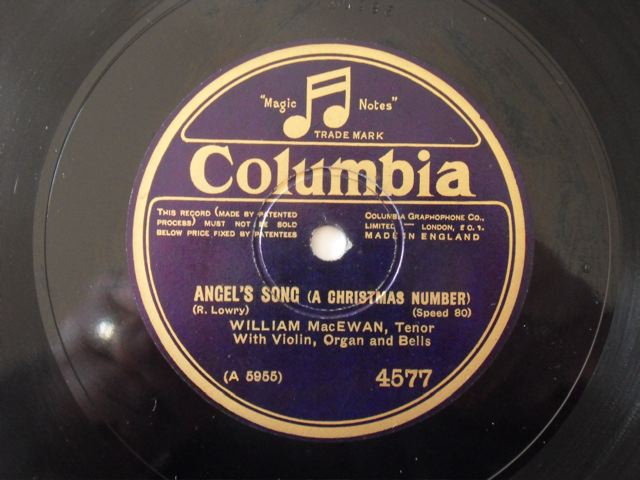
• Crown Him King of Kings (labeled “a Christmas number” - click the black arrow to download to your computer)
(words and music by Eben E Rexford, published 1912)
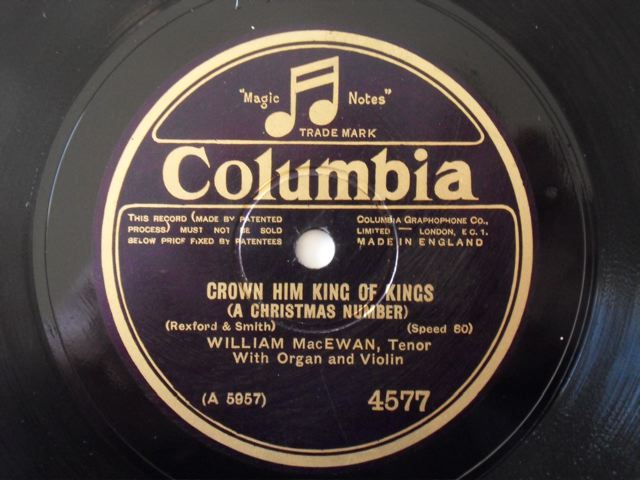
William MacEwan, the son of Ayrshire weavers, the grandson of a man from Ireland, the boy who grew up in a Psalms-only Covenanter congregation in Glasgow, became one of the most influential voices in gospel music across the western world. Thanks to everyone who has taken the time to give me positive and constructive feedback on this series. Please feel free to get in touch.
Mark Thompson,
Ballyhalbert, Northern Ireland,
December 2011
Part Ten: The Frank Wappat releases
OVER THE YEARS since William MacEwan’s death in 1943, his legacy has lived on in the record collections and memories of the older generation. However as the gramophone and 78s were superceded by LPs, there have been only a few re-releases of his music. I am indebted to Frank Wappat, formerly of BBC Radio North in Newcastle Upon Tyne, for the work he did over the years in making MacEwan’s music available again in three different formats in the 1980s and 1990s as audio technology developed:
1) a 13 track LP in the mid 1980s (released by Mawson & Wareham Music, Newcastle Upon Tyne, catalogue no MWM1029, in a shocking pink sleeve!)
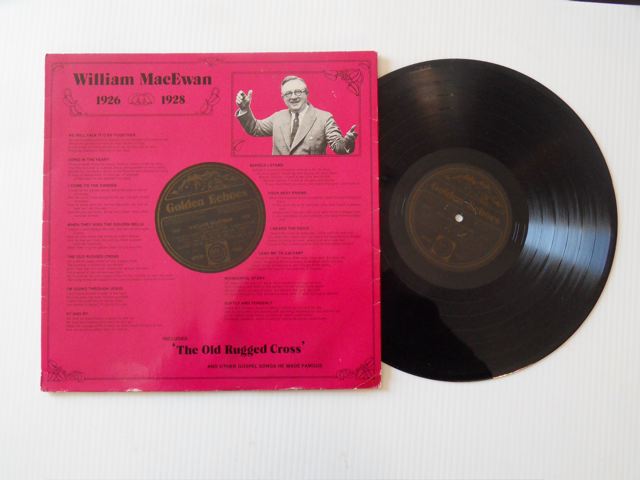
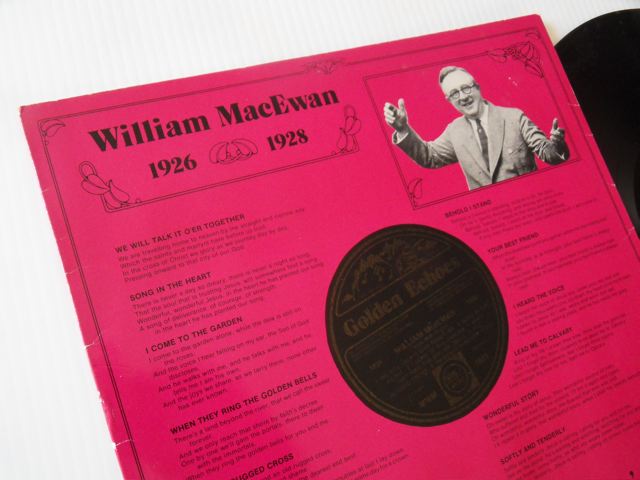
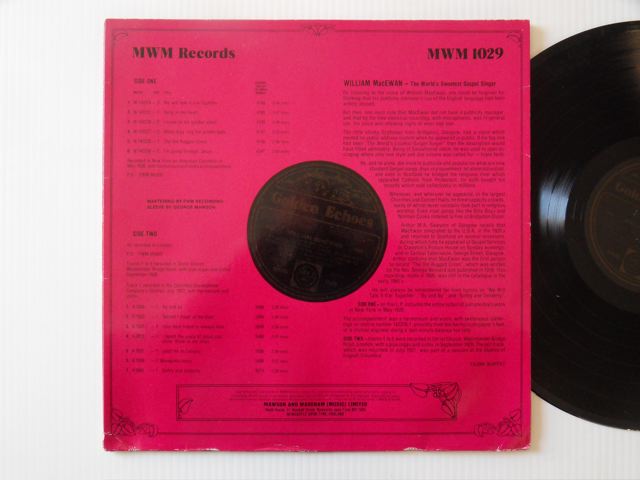
2) an 82 track triple cassette box set in the late 1980s / early 1990s (released by Frank’s own FWM label),
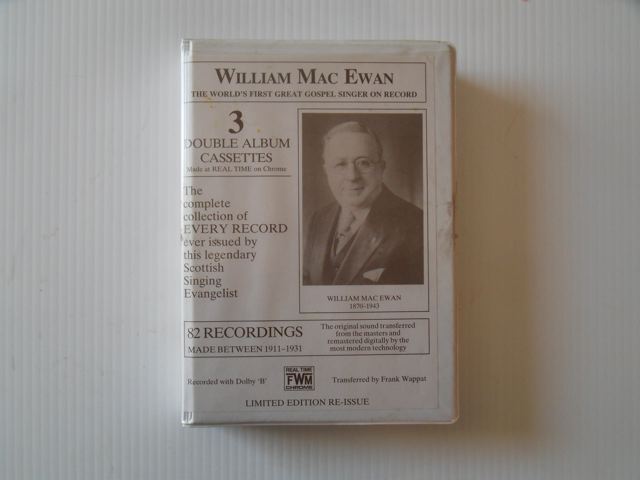
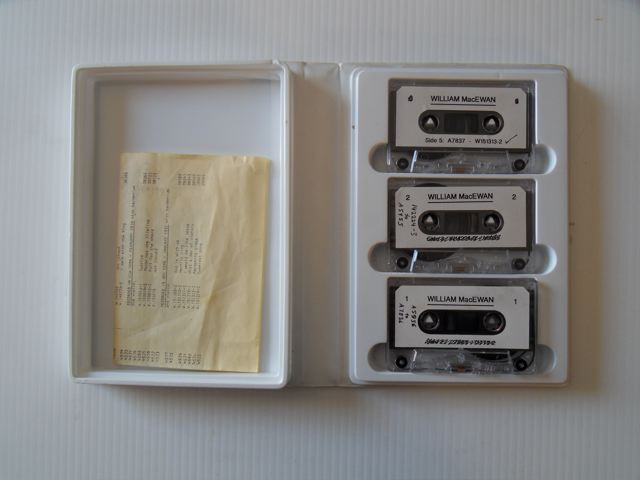
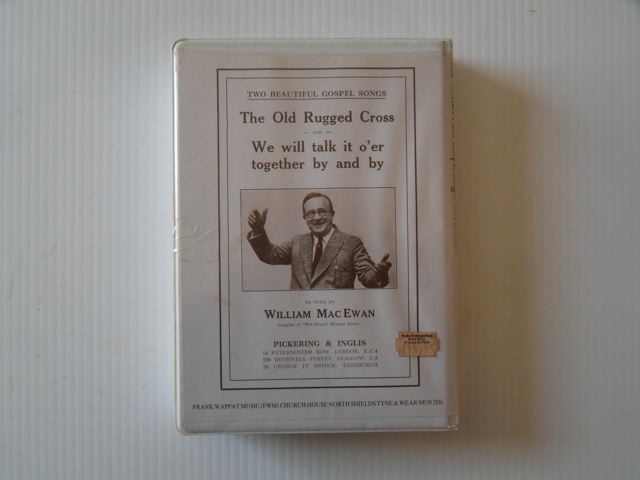
3) a 20 track CD (released by Lismor Recordings of Glasgow in 1994 as part of their “Scotland’s Stars on 78” series, catalogue no LCOM 5235).
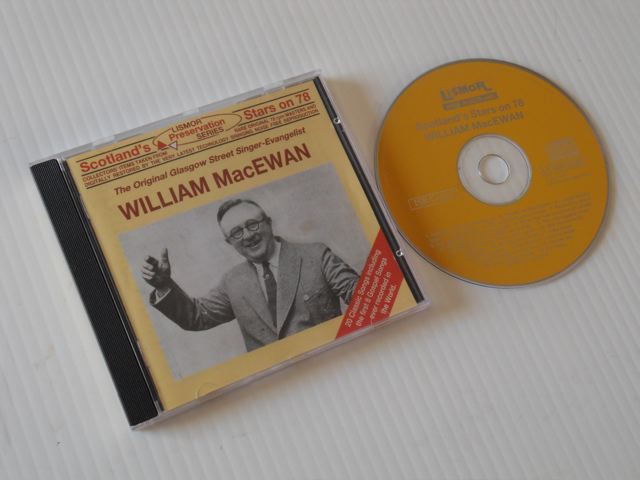
Sadly all of these are now out of production and are hard to find. Frank’s notes on the insert of the cassette box set have been my single source of meticulous information about MacEwan’s recording sessions; his notes on the LP sleeve and the CD booklet have also given me more insights. I have been in touch with Frank directly to thank him, but sadly his health was poor at the time. I wish him a speedy recovery and would like to take this opportunity to publicly acknowledge his work in carrying on an interest in the recordings of William MacEwan. (update - Frank Wappat sadly passed away in 2014).
Below are pics of the albums which his early 78s were sold in, one with a portrait photo (this is probably the 'fine art album' referred to in the Columbia catalogue here) and the other a black leather Columbia one which Joe from Ayrshire loaned to me earlier this year. I have since tracked down another one of these for myself, which had exactly the same selection of MacEwan records in it as Joe's does).
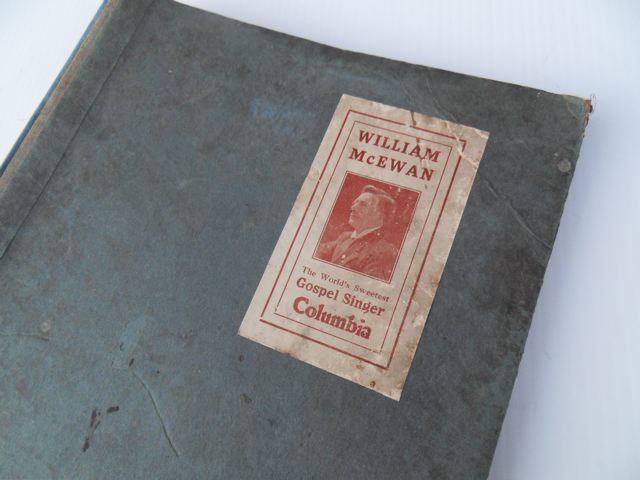
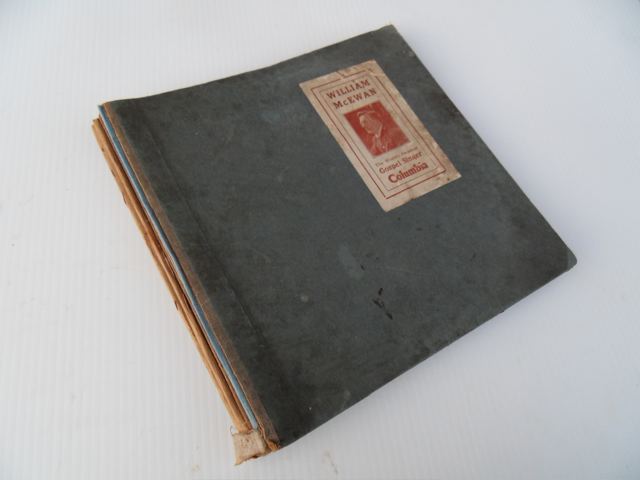
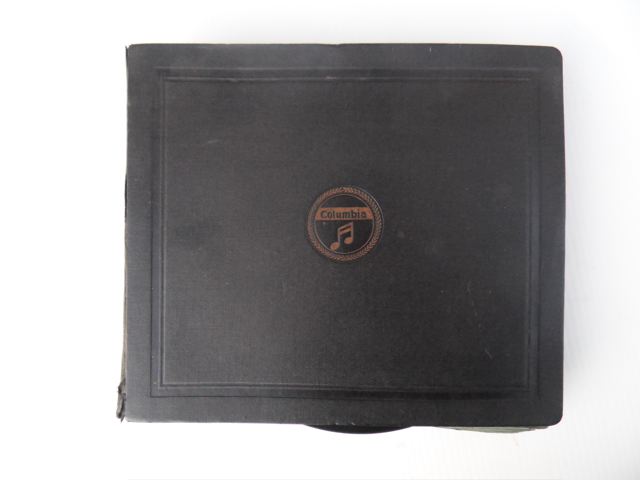
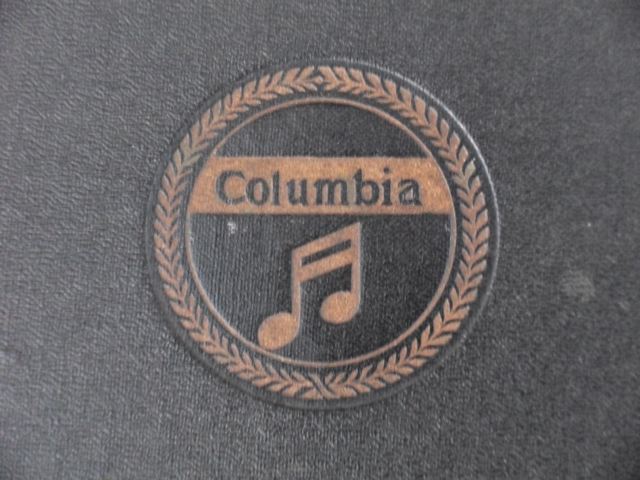
Finally, a sheet music book from the early 1940s:


To be continued
Part Nine: The final (London) recordings, death in 1943 and posthumous recognition in 1973
BY THE END OF JANUARY 1931 William MacEwan’s American recordings were all completed. The last sea journey I can find for him is on board the SS Auranta on 27 April 1931, apparently alone, sailing from New York to Glasgow. He is listed as a singer aged 59, with the address 9 Leyden Street, Maryhill, Glasgow.
The Ninth Recording Session, London, December 1931
William’s ninth recording session was back in London in December 1931 at Methodist Central Hall in Westminster. Backed by a pipe organ and violin he recorded these six pieces:
• God be with you till we meet again
(words by Jeremiah Rankin, music by William Tomer, published 1880)
• When the roll is called up yonder
(words and music by James Black, published 1893)
• O Love that Wilt not let me go
(words by George Matheson, Music by Albert Peace, published 1882)
• Some time we’ll understand
(words by Maxwell Cornelius, music by James McGranahan, published 1891)
There were three other tracks recorded at this session, two by an ensemble called the “Savoy Hotel Orpheans” and one other simply called “test record”.
The Tenth and Final Recordings, London, March 1932
His last ever recording session was back at Christ Church on Westminster Bridge Road in London, around March 1932, again backed by pipe organ and violin. This time an entire gospel service was recorded. The Rev Harold Dixon Longbottom (1886 – 1962) prayed and gave the Bible reading.
(Note of interest to Ulster readers: HD Longbottom had been assistant minister of “Protestant Reformers Memorial Church” in Liverpool since 1913. He was also a leading Orangeman and local Councillor in the city. He was Leader of the now-defunct Liverpool Protestant Party from 1927 – 1964, and was Mayor of Liverpool in 1950-51. “Protestant Reformers Memorial Church” joined the Free Presbyterian Church of Ulster in 1982. I am not suggesting that MacEwan shared Longbottom’s views or interests.)
The service was released as a double sided 12” record and included MacEwan singing:
• God Will Take Care of You
(words by Civilla Martin, music by Walter Martin, published 1904)
• The Old Rugged Cross
(words and music by George Bennard, published 1913)
• My Mother’s Prayer
(J.W. Van de Venter - written 1895)
• I Heard the Voice of Jesus Say
(Words: Horatius Bonar, 1846. Music: John Dykes, 1868)
• We will talk it o’er together bye and bye
(words and music by Mrs C H Morris, published c. 1914)
• Abide With Me
(Words: Henry Lyte, 1847. Music: William Monk, 1861)
William’s voice was never again recorded, although I have no doubt that he would have continued to sing at public events as he had done throughout his life. There is now a gap of 11 years where at this point I have no other information about him.
Death in New York, 23 June 1943
The final document I have found is his death certificate; it says that he died of cancer on 23 June 1943 at 1.15am, at Kings County Hospital in Brooklyn, aged 71. He had been hospitalized for 6 days. The certificate is signed by his daughter Jean McEwan Roche and it seems that William had been living with Jean before he went into hospital – his final address is that same as Jean’s given address – 69 Lafayette Avenue, Brooklyn, New York. Today the building is Academy Restaurant - pic below from Google Maps Street View.
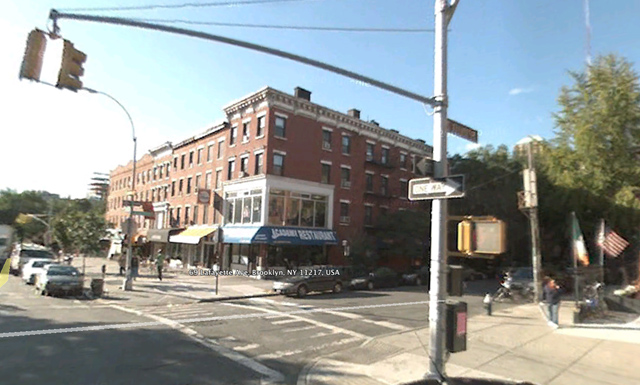
His trade/occupation is stated as singer/evangelist. Interestingly his first wife Jeanie, who had died about 20 years earlier, is stated as being his spouse – rather than his still-living second wife Mabel. Perhaps that is because the certificate was filled in by his daughter Jean, whose mother was Jeanie.
• OBITUARY
Here is his obituary from the Brooklyn Daily Eagle newspaper, 24 June 1943.
William MacEwan was buried at Cypress Hills Cemetery in Brooklyn. I have emailed the cemetery office to see if they can trace his grave and send me a photo of his gravestone, but have had no reply as yet.
Mabel seems to have lived to a ripe old age; I have found a death record for her dated February 1972 which gives her last residence at 10530 Hartsdale, Westchester, New York, SSN 451-38-7893. She was aged 78.
Royal recognition in Scotland
The following year, in September 1973, 30 years after his death, William MacEwan was officially recognised by the Crown when the Lord Lyon King of Arms in Edinburgh issued a Letters Patent and a new Coat of Arms to William’s daughter in law, bearing the motto “Crescendo”.
To be continued
Part Eight: The 1930s and the last American recordings
AS TIME GOES ON, the sources seem to dry up. I'm not sure if it's because, now almost 60 years of age, William MacEwan's career was slowing down, or whether his fame was waning, or if the news agenda had just moved on. It might also be that, at the point of writing this in December 2011, only some historical newspapers have been digitised - and therefore in future years as more come online then more information about him will become available. So far I've concentrated on US newspapers, so there may be additional information in British newspapers and evangelical publications of the time. Here are a few newspaper references from early 1930:
“…Mr William McEwan, of Long Island, N.Y., who is the evangelistic singer at the Methodist Church during the special meetings being held, entertained by a number of Scotch stories and also with some of his songs. Mr McEwan is a Scotchman, being born at Glasgow, Scotland, and he can tell a Scotch story…”
- ‘Five Visitors Attend Mt Union Rotary Club’;
The Daily News
, Huntingdon, 27.01.1930
“… he is now a gospel singer and has sung all over the world. He has sung in a large portion of the world with Chapman, Torrey, Beiderwolf, Gypsy Smith and Billie Sunday. He is an exclusive Columbia artist and his gospel song records may be bought at Laird’s drug store…”
- ‘Meeting Success in Evangelistic Work in Mt. Union”;
The Daily News
, Huntingdon, 28.01.1930
“…William McEwan of Long Island, N.Y., who is the evangelistic singer at the First Methodist Church during the special meetings in progress last week and this entertained with a number of Scotch stories and also with several Scotch songs. Mr McEwan is a Scotchman, being born in Glasgow, Scotland, and he is adept at telling stories of his mother country…”
- 1930, Jan 29,
The Altoona Mirror
(Pennsylvania)
The Seventh Recording Session, New York, Feb 1930
His seventh recording session came in February 1930, just two months after his sixth session, when he recorded three pieces with a harmonium and violin:
• Sunrise
(words by William C Poole, music by B D Ackley, published 1924)
• Throw out the Lifeline
(words by Edwin S Ufford, music by George C Stebbins, published 1890)
• Pull for the Shore
(words and music by Philip Bliss)
As with his sixth session, a fourth piece was recorded as well, but its title is unknown as it was never released as a record. For what it's worth, I think that "Pull For the Shore" is one of his strongest recordings, a popular hymn written in a sea shanty style by Philip Bliss (see here for background information on Cyberhymnal.com). I have digitised it below for you to listen:
Light in the darkness, sailor, day is at hand!
See o’er the foaming billows fair haven’s land,
Drear was the voyage, sailor, now almost o’er,
Safe within the life boat, sailor, pull for the shore.
Refrain:
Pull for the shore, sailor, pull for the shore!
Heed not the rolling waves, but bend to the oar;
Safe in the life boat, sailor, cling to self no more!
Leave the poor old stranded wreck, and pull for the shore.
Trust in the life boat, sailor, all else will fail,
Stronger the surges dash and fiercer the gale,
Heed not the stormy winds, though loudly they roar;
Watch the “bright and morning Star,” and pull for the shore!
Bright gleams the morning, sailor, uplift the eye;
Clouds and darkness disappearing, glory is nigh!
Safe in the life boat, sailor, sing evermore;
“Glory, glory, hallelujah!” pull for the shore.
Philip Bliss's tragic death in 1876, trying to save his wife from a burning train wreck, had become world-famous in evangelical circles; here is a present-day video production about him:
The 1930 US Census
On 1st April 1930, the US Census recorded these details about the MacEwan household (who were living at no. 40, 3728 Brooklyn, New York) :
• William McEwan aged 59, first married at age 20, a "WW" veteran
• Mabel McEwan, born New York, first married at 18, now aged 36 (Mabel was his second wife)
• Charles McEwan, son, aged 19, born Scotland
• Clayton McEwan, son, aged 17, born Scotland.
The Eighth Recording Session, New York, Jan 1931
In January 1931 he completed eighth recording session, which were to be his last American recordings. Now aged 60, and accompanied with a harmonium and violin he recorded:
• God Is With Us
(words and music by Lewis E Jones, published 1923)
• Merrily Sing
(words by Haldor Lillenas, published circa 1921)
• I Would Be Like Jesus
(words by James Rowe, music by B D Ackley, published 1911)
• What A Day of Victory
(words and music by James Rowe, published 1917)
• Pardoning Grace
(words by A H Ackley, music by B D Ackley, published 1914)
• Sweetest Song
(words and music by A H Ackley, published 1913)
To be continued...
Part Seven: 32 more recordings in the 1920s
WILLIAM MACEWAN was soon bound once again for Britain, for his fourth recording session for Columbia which took place in London in August 1927. Just before he left the USA, the 19 April 1927 edition of The Clearfield Progress (Pennsylvania) printed this article:
Farewell to Wm MacEwan
During the special Easter season services held at Trinity Methodist Church, the pastor, Dr E R Heckman was assisted by Mr William MacEwan, the Scottish Gospel tenor. He conducted the singing and introduced many catchy hymns from the hymnal ‘Faith Inspiring Songs’. Mr MacEwan enjoys a wide reputation having toured the British Isles and the Continent and America with all the great evangelists for the last twenty years. His solo work was most favorably received too.
Last evening the service took the nature of a farewell to this noted singer and the church was filled to express its appreciation of his work and its admiration for him. He sang two solos with much feeling and expression – 'My Ain Countree' and 'Annie Laurie'. He accompanied one of his own records on the Victrola, 'My Mother’s Prayers', and had the audience weeping. Mr Albert Adams rendered two very beautiful solos on the violin, which were very heartily received. The Booster Chorus, a band of boys and girls of the Sunday school, whom Mr MacEwan trained during his stay, sang two of his popular choruses. The children’s work met with great appreciation and showed the effect of the director’s good training.
To add colour to the evening, Mr MacEwan was dressed in his native Scotch kilts and he certainly looked the Scotchman that he was.
He leaves today for Richmond, Virginia, and then after his engagement in that southern city will make a tour of Scotland and Wales. Come again Mr MacEwan, Clearfield will always extend to you the welcome hand.
The Fourth Recording Session, August 1927
On 3rd June 1927 he boarded the SS Caronia in New York, bound for Plymouth. Presumably he completed his intended tour of Scotland and Wales during the summer before going back into the studio in London in August. The list of 18 hymns he recorded was:
• Tell it Wherever You Go
(words by Johnson Oatman Jr, music by William Edie Marks, published 1907)
• Will the Circle be Unbroken? (remake)
(Habershon / Gabriel - written 1907)
• God Will Take Care of You (remake)
(Martin / Martin - written 1905)
• My Father Knows
(words and music by Sarepta M I Henry, published 1909)
• Softly and Tenderly (remake)
(Will L Thompson - written 1880)
• Carry Your Cross with a Smile
(words by Ina D Ogdon, music by C H Gabriel, published 1916)
• Gospel Bells (remake)
(Martin / Sankey - written 1895)
• Mother’s Prayers have Followed Me
(words by Lizzie De Armond, music by Bentley D Ackley, published 1912)
• Only a Sinner (remake)
(Gray / Towner - written 1905)
• Angels Song (labeled “a Christmas number”)
(words and music by Robert Lowry; date of publication unknown)
• My Mother’s Prayer (remake)
(J.W. Van de Venter - written 1895)
• Crown Him King of Kings (labeled “a Christmas number”)
(words and music by Eben E Rexford, published 1912)
• Thou Remainest (remake)
(Whittle / McGranahan - written 1884)
• His Eye is On the Sparrow (remake)
(Martin / Gabriel - written 1905)
• He Lifted Me (remake)
(Gabriel - written 1905)
• Broken Heart (remake)
(Dennis / McKinney - written early 1900s)
• Sweeter as the Years Go By
(words and music by Leila N Morris, published 1912)
• All Hail Immanuel
(words by D R Van Sickle, music by C H Gabriel, published 1910)
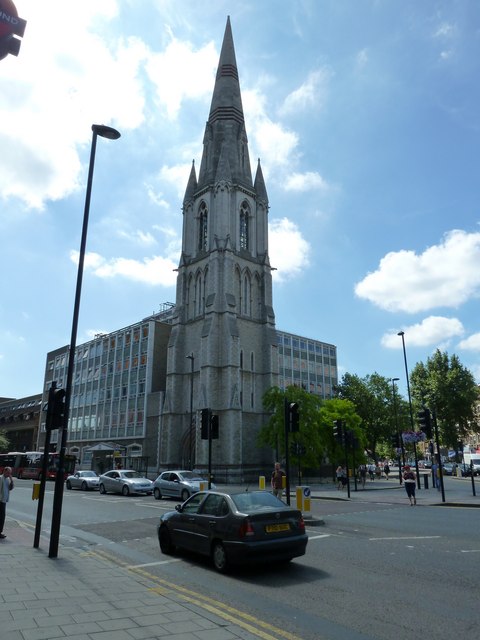 The Fifth Recording Session, October 1928
The Fifth Recording Session, October 1928
Just over a year later he was back in London. In October 1928 he completed his fifth recording session - this time in a church rather than a recording studio - at Christ Church, Lambeth (shown left). It was then a Congregational chapel, but just 12 years later it would be very badly damaged during the blitz of WW2; today only the spire remains. Accompanied by a pipe organ and violin he recorded this selection of hymns, two of which were remakes:
• By and By
(words by Fanny Crosby, music by Bentley D Ackley, published 1915)
• I Need Jesus
(words by George Webster, music by CH Gabriel, published 1924)
• Behold I Stand at the Door
(author and date unknown)
• Your Best Friend is Always Near (remake)
(words by Isabel Allam, music by Edwin Excell, published 1916)
• In My Heart there Rings a Melody
(words and music by Elton Roth, published 1924)
• I Heard the Voice of Jesus Say
(words by Horatius Bonar, published 1846)
• Satisfied
(words and music by Alfred H Ackley, published 1910)
• Lead Me to Calvary
(words by Jennie Hussey, music by W J Kirkpatrick, published 1921)
• Sail On
(words and music by C H Gabriel, published 1908)
• Wonderful Story (remake)
(words and music by C H Gabriel, published 1897)
William McEwan, now aged 56, headed back to his family in America. He sailed onboard the SS Leviathan from Southampton on 14 December 1928 and arrived in New York on 20 December, just in time for Christmas. The passenger records give his address as 938 East 31st Street Brooklyn.
His Atlantic-hopping continued; he made a quick return to Britain, and on June 19th 1929 William MacEwan once again sailed back to America, from Southampton to New York on the SS Olympic, arriving on June 25th. The passenger list gives his address as 119 Schermerham St Brooklyn NY.
The Sixth Recording Session, December 1929
His sixth recording session was just six months later, in December 1929 in New York, accompanied by a harmonium and violin:
• He Must Reign
(words and music by C Austin Miles, published 1926)
• March On
(words by Elsie D Yale, music by J Lincoln Hall, published 1917)
• I Walk With the King
(words by James Rowe, music by Bentley D Ackley, published 1913)
A fourth piece was recorded, but its title is unknown as it was never released as a record. As the 1920s drew to a close, William MacEwan was approaching 60 years of age. He was at the prime of his career and was one of the world’s most accomplished recording artists.
Part Six: American citizen, London 1922 recordings
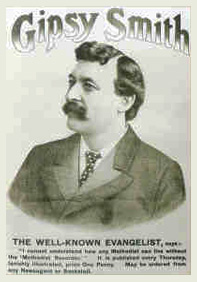 WITH HIS WAR SERVICE NOW OVER, MacEwan completed his time with the Biederwolf campaign and some time around 1922 he joined up with Columbia Records labelmate the English Methodist evangelist Rodney ‘Gipsy” Smith. It was during a major gospel campaign of April that the Syracuse Herald of 11.04.1922 reported that:
WITH HIS WAR SERVICE NOW OVER, MacEwan completed his time with the Biederwolf campaign and some time around 1922 he joined up with Columbia Records labelmate the English Methodist evangelist Rodney ‘Gipsy” Smith. It was during a major gospel campaign of April that the Syracuse Herald of 11.04.1922 reported that:
“…William McEwan, chorister, wasn’t there. He was in Newark, N.J., his home city, yesterday, completing his naturalization as an American citizen…”
The next day the same paper reported:
“ It was American night at the Arena last night. William McEwan, Gipsy Smith’s choir leader, returned yesterday from Newark N.J. where he received his final papers as an American citizen on Monday. As he entered the building last night, the choir, led by Prof. Hugh M Tilroe (?), arose to sing ‘America’. The audience stood and sang also. When Gipsy Smith had announced the benediction at the close of the meeting, the choir sang ‘The Star Spangled Banner”. With the exception of three persons in the east balcony, everybody arose again. This time Mr McEwan was leading. “Stand up” he shouted to those three persons, as loud as the cold he had contracted at Newark would permit him. “Whenever you hear that tune you stand.”
“Oh but America is a great country,” announced McEwan as he reached the platform.
“Yes, but you can’t sing like you could when you were a Britisher” returned Gipsy Smith.
The 20 April 1922 edition of the Syracuse Herald records that MacEwan and Smith held a “patriotic night” at the Arena aimed at war veterans – Smith told the story of his own military service during WW1 (his 1918 book "Your Boys" is available here on Archive.org) at a special evening entitled ‘Three and One-Half Years in the Trenches'. He and fellow veteran MacEwan sang the parting solos.
The second recording session – London, June 1922
Shortly after the campaign was finished, William headed back to Britain. He recorded a selection of six pieces, accompanied by what sounds like a very good Salvation Army band, or perhaps a small orchestra, for Columbia in London in June 1922. The songs were:
• Jesus, Blessed Jesus
(words and music by C H Gabriel, published 1906)
• Oh it is wonderful
(words and music by C H Gabriel, published 1898)
• Wonderful Story
(words and music by C H Gabriel, published 1897)
• Your best friend is always near
(words by Isabel C Allam, music Edwin O Excell, published 1916)
• Wonderful peace
(words and music by Haldor Lillenas, published 1914)
• Little bit of love
(words and music by Edwin O Excell, published 1904)
He returned to America, alone, onboard the SS Berengaria which sailed from Southampton to New York on 8th July 1922. And in October of the same year, the MacEwans returned to Scotland. The passenger list for the SS Algeria, sailing from New York to Glasgow via Moville in Donegal and arriving on 2 October 1922, includes this list:
William McEwan, 3 Glencairn Drive, Pollokshields, Glasgow (singer) aged 50
Mabel A McEwan housewife aged 29
Mary Miller McEwan student aged 21
Charles P McEwan student aged 10
Clayton McEwan student aged 8
I’m not sure when William and Mabel got married, but it seems that she already had a daughter, Mary. Other records say that Mabel Alice McEwan was born in New York on 6th July 1893.
William remained in Scotland until April 1923. The passenger list for the SS Aquitania, dated 6 April 1923, and sailing from Southampton to New York includes Mabel Alice McEwan was born in New York on 6th July 1893 ; a 21 year old daughter, Mary M McEwan ; Charles Parker was 12 years old, born 11 Feb 1912 in New York ; Clayton Edward was 9 years old, born 23 October 1914 in New York.
'McEwan's Mission Songs' published
Around this time, MacEwan's name was ascribed to another hymnbook. "McEwan's Mission Songs - a Choice Collection of Solo, Duet, Quartet and Choir Numbers" was a selection of 54 hymns. It was published by R.L. Allan & Son in Glasgow, and Oliphants in London. It had a foreword written by Rev Samuel MacAuley Lindsay the Pastor of First Baptist Church in Brookline, Massachussetts.
Covers of the first and revised editions:
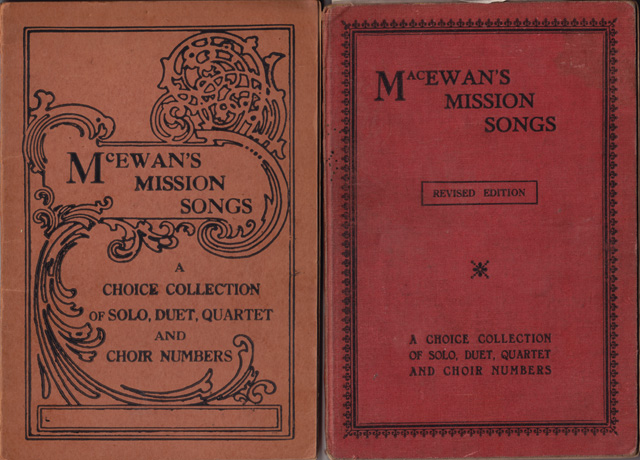
Advert inside the revised edition:
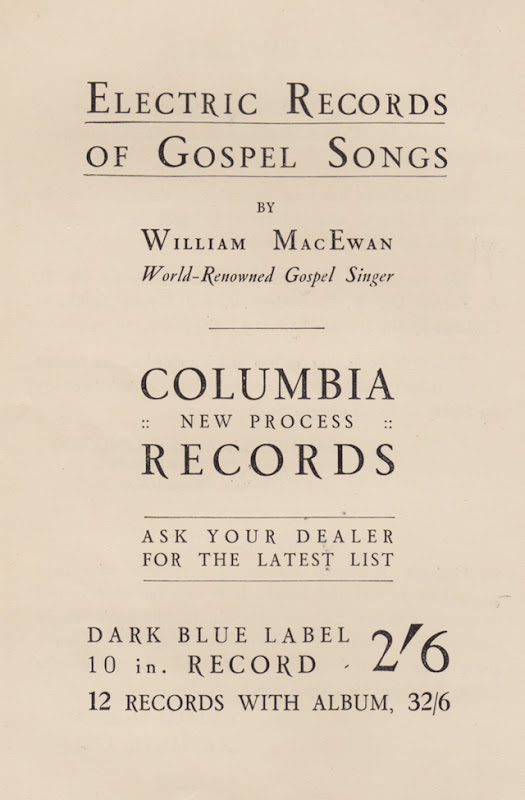
But William was back in Scotland again in 1924; his passport application of 4th August 1924 states his reason for traveling was “visit father” James MacEwan in Glasgow. He sailed from Montreal to Southampton onboard the SS Majestic on 12 September. He returned to New York just a month later – the passenger list for the SS Lancastria which sailed on October 15th from Southampton to New York includes a 52 year old William McEwan from Brooklyn.
The Third Recording Session, New York 1926
William’s next recording session was in New York in May 1926. These are said to be the first recordings in the world to use an electrical microphone. By now aged 54, he was accompanied by a simple harmonium and violin. The six pieces were:
• We will talk it o’er together bye and bye
(words and music by Mrs C H Morris, published c. 1914)
• Song in the heart (Wonderful Wonderful Jesus)
(words by Anna B Russell, music by Ernest O Sellers, published 1921)
• In the Garden
(words and music by C Austin Miles, published 1912)
• When they ring the golden bells
(words and music by Daniel de Marbelle, published 1887)
• The Old Rugged Cross
(words and music by George Bennard, published 1913)
• I’m going through Jesus
(words and music by Herbert Buffum, published 1914)
The Voice of "The Old Rugged Cross"
It was MacEwan's recording of “The Old Rugged Cross” that really captured the public imagination. Many years later, in the October 1940 edition of The Gramophone, Herbert C Ridout, the former publicity manager of the Columbia Graphophone Company (London), wrote this glowing retrospective:
“…A Scots-American singing evangelist named William MacEwan had persuaded Sterling that there was a large public here interested in his gospel songs to such an extent that it would be worth while recording twenty-four titles and putting up the twelve records in an album. It was a bold thing to do, for sacred records had only represented a modest, if steady, share of the total sales.
But we had an agreeable surprise, for the MacEwan records not only sold handsomely all round, but there was one title that stood out as a tremendous favourite. Yet to the average man, who, whether religiously-minded or not, knows most of the well-known hymns, it was completely unknown. This was a hymn called "The Old Rugged Cross," written by the Rev. George Bennard. It had been largely used in the revival campaigns in this country and America.
Hundreds of thousands of "The Old Rugged Cross" records must have been sold, and until recently William MacEwan was the only record-exponent of it
. You'll find this, and a number of others, in addition to the original dozen in this MacEwan series made in 1911 (since rerecorded electrically, of course), still in the catalogue serving its public.
In my experience I have never known any other hymn record to equal "The Old Rugged Cross" in sales — that's why I mention it as a landmark of its kind
…”
Quite some accolade, and gives us an insight into the enormous impact of William MacEwan. This website says that "...Within thirty years of its initial publication in 1913, more than twenty million copies of "The Old Rugged Cross" had been sold, outselling every other musical composition of any kind published to that date...". Some research is definitely needed to confirm these statistics.
[ Note - it was around this time, in April 1927, that a New York record company executive called Ralph Peer travelled into the Appalachian Mountains to set up an impromptu recording studio in Bristol, Tennessee. The "Bristol Sessions" as they became known included obscure hillbilly performers who would become world-famous, such as The Carter Family, who later recorded countryfied, acoustic, three-part harmony versions of some of the hymns William MacEwan had recorded and popularised, including "The Old Rugged Cross". Johnny Cash would later marry one of the Carters - here is a video of Cash and June Carter singing "The Old Rugged Cross" at a packed football stadium in the 1970s/80s, possibly part of a Billy Graham campaign. Cash introduces it as being "the biggest selling sheet music in the last 100 years":
]
The Fourth Recording Session – London, August 1927
Perhaps the meteoric success of The Old Rugged Cross inspired Columbia to dust-down the MacEwan back catalogue. In August 1927 he recorded 18 songs, 12 of which were remakes of songs he had recorded before.
{ To be continued }
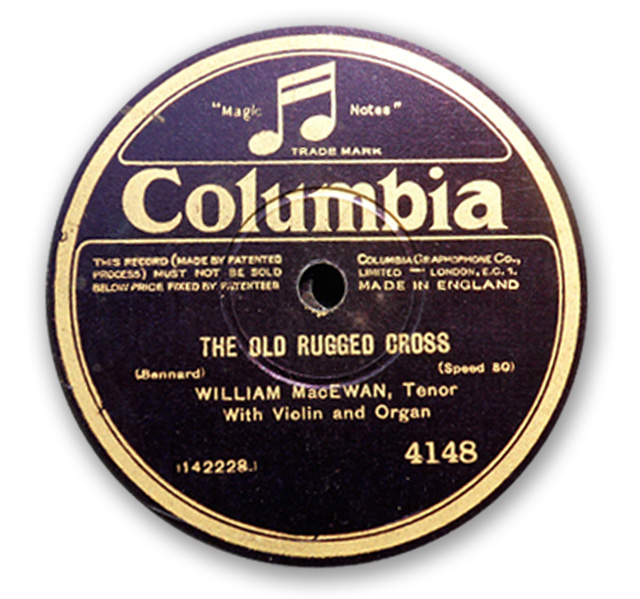
Part Five: William MacEwan's wartime service, 1917-1918
His nephew John McEwan had been killed in the Battle of Loos on 26 November 1915 where he was serving with the Black Watch Royal Highlanders. One source says it was 21 July 1917 when his own son, William McEwan junior enlisted with the US Army Medical Corps. Here he is on the right hand side, in an earlier clipping from the Press and Sun-Bulletin (Binghamton, New York) of Tuesday, April
Within weeks, William senior had been approached by the US Army to become a singing instructor. He joined the War Department Commission on Training Camp Activities at Camp Jackson near Columbia, South Carolina. He was attached to the quartermaster corps at large, and was aide to Brigadier General Francis Henry French, the commandant. McEwan is mentioned on p197 and p207 of this book about the camp. He also features in this 1919 book: Camp Music Division of the War Department, and in this 2016 book, Singing, Soldiering and Sheet Music in America during the First World War.
The links and similarities between William McEwan and Harry Lauder are very interesting; Lauder’s son John was killed on 28 December 1916, a story told in his book A Minstrel in France (online here). The clipping below is from 29 August 1917:

In September 1917 McEwan reported of leading a ‘Colored Soldier Community Sing’ with 10,000 men in attendance. Interestingly he found that the Black soldiers were ‘enthusiastic and appreciate being taught new songs … the only time I spend on them is to improve their rhythm and keep them from over-harmonizing’. What a sound that must have been! While at Camp Jackson, McEwan compiled two ‘broadsides’ – Songs the Soldiers and Sailors Sing (online here) and Hike Songs No. 2.
He was then moved north to Camp Devens in Massachusetts; this clipping is from 4 October 1917:
This from 3 December 1917 - an attempt to form the world’s biggest men’s choir, and also a near-death experience in a train crash, reminiscent of the crash which had killed hymnwriter Philip Bliss in 1876:
On 19 March 1918 in Camp Devens newspaper Trench and Camp, he explained some of his personal background, and prepared to cross the Atlantic once again:
In a Roll of Honour article of 20 May 1918, the Press and Sun-Bulletin printed the names of father and son together:
On 7 October of that year, McEwan was back home, and expressing his frustrations on what seemed like a lack of public support for the war effort.
But just over a month later, on 11 November 1918, the war was over, and the MacEwans were back home. But sadly the family had only a few months left together, as William's wife Jeanie died on 25 July 1919.
Part Four: Stardom in America, a Lucrative Offer Rejected and two Wartime bereavements
SOME HAVE SAID THAT William McEwan was ‘the world’s first gospel singer on record’. However there were a few others around the same era. Ira D Sankey (1840-1908) was of Scotch-Irish descent and was a pioneer ‘musical director’ in large-scale evangelism. He had recorded a series of cylinders (the technology which predated records) in the mid 1890s. You can listen to one of them here on Archive.org.
As far as records are concerned, William Booth, founder of the Salvation Army, made four preaching records, with no singing or music, for Columbia in 1907.
English Evangelist Rodney “Gipsy” Smith recorded 13 hymns for Columbia Records around the same time as (and perhaps slightly earlier than) William McEwan - the two men were marketed together in Columbia’s sales catalogues. In America, Homer Rodeheaver made his first gospel records for the Victor label in 1913. Smith, Rodeheaver and McEwan would work together in evangelistic missions in the USA during their careers. So it might be fairer to say that all three – the Englishman Smith, the Scot McEwan, later followed by the American Rodeheaver – were the three pioneers of recorded popular gospel song.
With 24 records now under his belt, William, Jeanie and the three children returned to the USA where a fourth child, Charles Parker McEwan, was born in New York on 11 February 1912. The family returned to Scotland before the summer, onboard the SS California which sailed from New York to Glasgow via Londonderry – just 2 months after the sinking of RMS Titanic - arriving on 24 June 1912. William’s stay in Scotland was short - the passenger list for the SS Arabic included a 40 year old singer called William McEwan – she sailed from Liverpool to Boston, arriving on 13 August 1912.
America once again
While he waited for the family to arrive, Autumn 1912 saw William back in at the deep end of evangelistic missions. Homer Rodeheaver had been the musical director for Presbyterian evangelist Rev William E. Biederwolf of Indiana, but he had recently moved on to team up with the renowned Billy Sunday. (an obituary for Rodeheaver summarised their partnership as follows: “…they formed the most famous revival team of the century. They were destined to preach and sing to countless millions, win converts by the hundreds of thousands, to battle the liquor traffic until their very names struck terror into the hearts of brewers and distillers, to stir the nation to a spiritual quickening that packed the churches, purged cities of corruption, enthroned Christ in unnumbered thousands of homes across the nation. It was always a team of these two consecrated men, who complemented each other, both spectacular in performance, humble in spirit, both passionately in love with evangelism...” The same obituary described Rodeheaver’s childhood as “…boyhood days spent in the hills of Tennessee where he learned to play the guitar and banjo…”. He was reared in Newcomb, Campbell County, Tennessee, in the mountains close to the Kentucky state line. It seems to me that, despite his surname, Rodeheaver was culturally Scotch-Irish!)
William McEwan filled Rodeheaver’s shoes in the Biederwolf campaigns and introduced a new element to the meetings, where he would sing along with his own records. The newspaper The Daily Republican, of Rushville in Indiana, gave this account on 30 October 1912 in an article entitled ‘M’Ewan Tells His Life Story’:
“…The program was opened with ‘All Hail the Power of Jesus’ Name’ by the choir. After a prayer by the Rev W. A. Wylie and the scripture reading by the Rev A.W. Jamieson, the choir sang ‘All Hail Immanuel’. McEwan sang ‘God Will Take Care of You’ and then ‘Shadows’ both of which were loudly applauded. The duet which McEwan sang with himself was the big hit of the evening. He sang with a record of his own voice on a Victrola, and the similarity between the two was very noticeable. After the choir sang again, McEwan played ‘My Ain Countree’ on the Victrola, and the resemblance of the record to the way McEwan has sung it here was very pronounced. McEwan thanked Robert A. Innis for the use of the Victrola and George C. Wyatt & Co. for the use of some extra records he played…”
The same newspaper, just 2 days earlier, recounted a conversation where McEwan said that his family roots were in Ayrshire. His star was rising fast, and he was selected to join what became known as the National Male Quartette, alongside James Heaton, E.C. Miller and LL Kemper. On Friday 29 November 1912 the newspaper The Republican News (of Hamilton, Ohio) printed a large article about the four men, along with a group photograph. They also included a large portrait of William McEwan surrounded by a graphical frame of thistles.
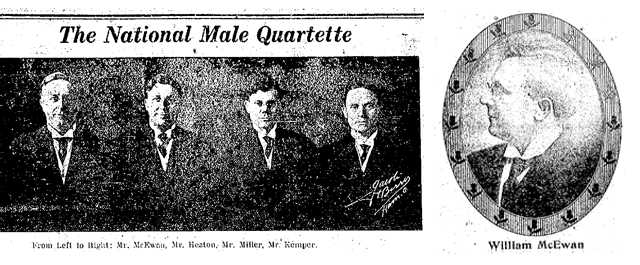
The article includes this short autobiographical piece ‘A Song that Helped, by Wm McEwan’:
“…Several years ago a great spirit of disappointment came over me as in looking over my Gospel Singing career I could not possibly call to my remembrance a single person what had been won to Christ through my singing. The more I thought of it the more miserable I got, until I waited on God to give me a sign that some one had been blest through my ministry of song. The answer came in a very unexpected way. The evangelist I was with (Rev H D Sheldon) that night for some reason or another asked those who had been won for Christ in the meetings to tell what had awakened them to a consciousness of their need of a Saviour. One young man stood up and with tears in his eyes said that he was awakened through Mr McEwan’s singing of ‘He Died of a Broken Heart’. I almost felt like shouting for joy when I realised that I had an answer to my prayer. I learned the lesson then to go on and sing with grace in my heart unto the Lord knowing that he will use the song if sung to His glory…”
Jeanie and the four children had stayed at home in Scotland since the summer, and they travelled to America to join William just before Christmas, sailing from Glasgow to New York on the SS Columbia, arriving on 18 December 1912.
"Nervous Breakdown"
However, the strain of constant travel, evangelism and fame seems to have taken its toll on William. The Binghamton Press of 18 June 1913 recorded that he had suffered what it termed a ‘nervous breakdown’:
“… M’Ewan is Greatly Improved in Health : William McEwan, choirmaster of the Dr W E Biederwolf evangelistic party, who has been on a vacation in the Adirondack Mountains for three weeks returned home on Sunday much improved in health. Mr McEwan has been suffering from a nervous breakdown and heamorrhage of the lung, brought about by the strain of constant singing…”
Just a few weeks later, he was back on stage, but this time it was to perform in a benefit concert to raise money to enable him to go back to Scotland. The Gazette and Bulletin (Williamsport, Pennsylvania) of 25 July 1913 included this article, showing that McEwan wasn't just a singer, he was an imaginative 'multi-media' communicator:
“…Sings Duet with himself – William McEwen introduces this feature in his benefit concert tonight: William McEwen the Scotch tenor who conducted the music of the recent Biederwolf campaign arrived in Williamsport yesterday morning to complete arrangements for his concert in the Airdome tonight. The Biederwolf chorus will assist. Those who have heard Mr McEwen sing his many sacred songs will be more than pleased to have this opportunity to hear him sing some of the folks songs of 'his ain countrie'.
Several of his songs will be sung with steroptican illustrations, and those who have seen Mr McEwan's slides at the rehearsals declare that they are extraordinary in beauty and in breadth of collection. Mr McEwan has brought his own operator and there can be no difficulty in showing the slides to the best advantage.
The feature of the evening will be the strikingly unique performance of hearing a man sing a duet with himself. Mr McEwen sings a duet with himself and one or two intimates in this city have heard him do it, and they take oath that it is one of the most interesting and melodious bits of singing they have ever heard. Those who recall the hit Mr McEwen made during the campaign when he told the vast crowd that his chorus was so familiar with a certain song that they could sign it backward, and straightaway had them do so, are prepared to believe that the little man has more than ordinary powers to perform astounding feats.
Some of Mr McEwen's songs will be sung with an accompaniment of humming by the chorus that is very effective. To vary the concert some of the tenor's records of his own songs sung by himself will be played on the grafanola.
The concert to be given tonight by Mr McEwen and the Biederwolf chorus is for the benefit of the singer himself, the proceeds to be used to defray his expenses to Scotland, where he hopes to regain his health. It was stated yesterday that F W Vandersloot would accompany him on the journey. W.E. Biederwolf will also be one of the party. The concert in the Airdome tonight will begin at 8 o'clock. Following is the complete program:
"Steadily Marching On" - Williamsport Chorus Choir
"Clinging" - Williamsport Chorus Choir
Solo - "My Ain Countrie" - William McEwan
"Sextette from Lucia"- Williamsport Chorus Choir
Duet - "I've Tried In Vain" - McEwan with himself
Solo illustrated - "Memories of Mother" - William McEwan
"Master the Tempest" - Williamsport Chorus Choir
"The Old and New Home" - Rev and Mrs Dorsey N Miller
"Gospel Bells" - Grafanola selections
"Some Day" - William McEwan
Solo obligato - "From Every Stormy Wind" - William McEwan and Choir
"His Word Shall Stand" - Williamsport Chorus Choir
Solo illustrated - "The Broken Heart" - William McEwan
"Lead Me Gently" - Williamsport Chorus Choir
"The Bridal Procession" - Rev and Mrs Dorsey N Miller
Solo illustrated - "I Wonder How the Old Folks are at Home" - William McEwan
"All Hail Immanuel" - Chorus Choir
"Auld Lang Syne" - William McEwan ..."
But even though William McEwan was heading back to Scotland, his voice could still be enjoyed in the USA thanks to the latest technology of the 10" 78rpm record which could be played on a 'talking machine' gramophone. The advert below offers what must have been the 1913 equivalent of an iPod and an iTunes voucher - a McEwan-endorsed Victrola and 12 songs - in a newspaper dated 14 November 1913.
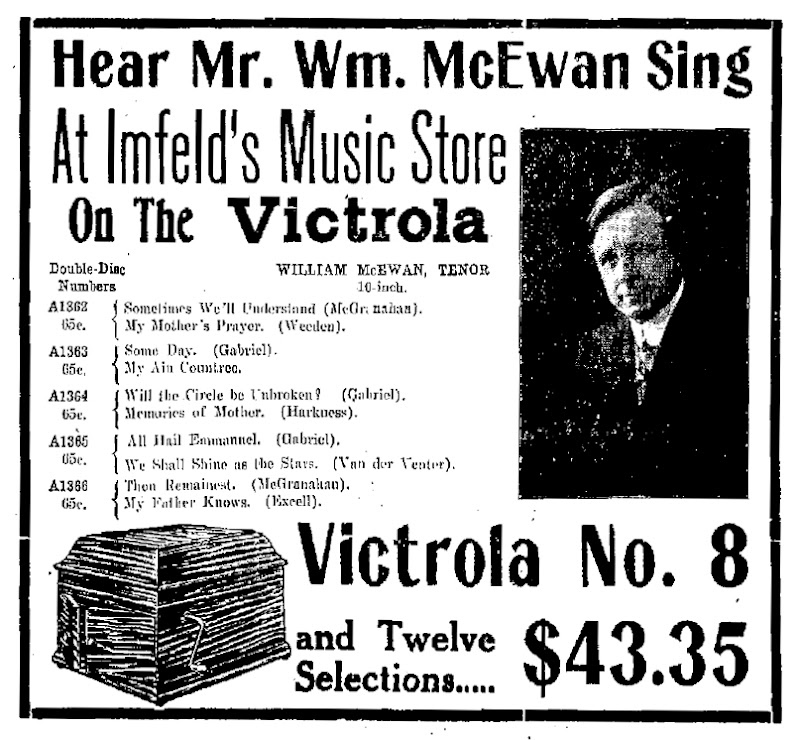
 'M'Ewan's Song Evangel' is published
'M'Ewan's Song Evangel' is published
William recuperated and returned to America, sailing on the SS Cameronia from Glasgow on 6th September 1913 and arriving in New York on the 14th. The following year, 1914, saw William McEwan’s first publication. ‘McEwan’s Song Evangel – a Choice Selection of the very latest Gospel songs, specially adapted for solo singers, choirs, etc.’ contained 236 hymns and gospel songs. The collection, which was a music edition with full notation for every piece, was compiled by Wm McEwan and edited by E O Excell, with William Biederwolf providing a short foreword. The copy I have seen was published in Glasgow by the Scottish Bible & Book Society (R.L. Allan & Son) and in London by The London Book and Bible Saloon (Alfred Holness), with no American publisher stated.
‘McEwan’s Song Evangel’ featured hundreds of standard pieces, but also a selection which McEwan had either written or co-written. These were: The Glad New Song, Keep on Praising, To The Field, Still Wave the Gospel Flag, I Believe, He First Loved Me, My Mother’s Songs, One By One We’re Passing Over and With You Always. None of these are widely known today.
'My Mothers Songs' is no 138 in the book, and was written by McEwan as a medley of three older famous hymns - Abide With Me, Jesus Lover of My Soul, and Safe In The Arms of Jesus - connected by a sentimental narrative which was "Dedicated to Evangelist W.E. Biederwolf's Sainted Mother". It is available to listen here, courtesy of Archive.org
For the Gospel, not the Money: McEwan turns down $350 and accepts $20
The family continued to expand - Clayton Edward McEwan was born in New York on on 23rd October 1914. And William’s audiences expanded too. His talent and popularity had not gone unnoticed in the secular entertainment world. Big-money offers came in. The Alton Evening Telegraph (Alton, Illinois) of 1 Feb 1915 reported that William Sauvage, the owner of three theatres in Alton, had publicly offered the National Male Quartette residency in his Hippodrome theatre for a fee of $350 per week (this roughly equates to $8000 / £5000 a week in today’s money!!) and that William McEwan had been made an additional ‘special offer’ of an unspecified amount. McEwan turned it down flat:
"...Sauvage would hire male quartette; makes good proposition to members which has not been accepted... the members of the party do all their vocal work in connection with evangelistic meetings. Their voices are of high quality and their work as singers is such as would command very high prices if they were travelling about the country appearing in theatres. Mr McEwan, as a soloist, has a wide reputation, and but for the fact that he never sings anything but such songs as would be popular in a revival, he too would be starring in the amusement world..."
McEwan was not interested in 'amusement', fame, wealth or celebrity. What little fame he had was only as a result of his first love and conviction, singing the message of Jesus Christ.
Just nine days later, the same newspaper in its 10 Feb 1915 edition gave an insight into William McEwan’s talents and astonishing popularity (and therefore his commercial potential which had led to Sauvage's offer). In terms of public popularity, the article's headline said that McEwan was second only to former US President Theodore Roosevelt! :
"Mac's Night F-I-N-E; send off G-R-E-A-T: Was big joy party: Tabernacle crowded beyond capacity and only Teddy Roosevelt skinned Mac's crowd at station: "All ready - Sing!" "F-I-N-E!, F-I-N-E!" Right in these words you get the sentiment of Mac's big choir concert up at the tabernacle, everybody had sing in their hearts and fine, fine in their minds and Mac's farewell party was altogether one of the happiest affairs ever held in Alton.
By six o'clock the tabernacle was half full and before seven o'clock the seats were almost gone and shortly after that hour standing room was at a premium.
The choir presented a beautiful appearance, the lady singers all dressed in white and the male singers all being dressed in black and they were arranged on the platform so that it looked like one mass of black and white so regular were the lines. It was an inspiring sight and Mac was more tickled about it than anybody and was as proud of his choir when he got them all seated as a boy could be of a new baseball.
Mac bragged on his choir and said that it was a wonderful choir and then he had them sing the 'Awakening Chorus' that was sung when the meetings first opened. After this, Director William McEwan, for Mac was up and full of business now, mounted a chair and directed the choir in singing 'When We All Get to Heaven'. He had them sing it again and keep time clapping their hands, presenting a beautiful sight. Then he announced they would sing it backwards, they knew it so well, and the choir members turned backs on the audience and sang it backwards. The choir sung 'The Victory Song', 'All Hail Immanuel', 'The Awakening Chorus' and 'All Hail the Power of Jesus' Name'. McEwan sung a duet with himself sitting alongside the phonograph and singing with one of his own records. Mrs Abbott Blair sand a sweet song to the air of 'Last Night the Nightingale' and for an encore sang 'Just as I Am' and her audience was wonderfully well pleased.
At this point Prof R C Richardson came from the choir to the stage and McEwan, somewhat perturbed and anxious, thought he had a mutiny on his hands and tried to push Prof Richardson. But he pressed on and took the floor. Mr Richardson said he represented the choir whom Mac had berated and jumped on and yelled 'Sing!' and 'Fine!' and that they would now get even and he handed the jovial little choir director a box. Prof Richardson said that when the great choir was formed in Heaven, when all the thousands of singers McEwan has directed on both continents were gathered there that he expected, when he arose to sing in that great chorus, to see a little rotund good natured director mount a chair, raise his baton and looking over the great heavenly chorus shout 'Sing!'.
Mac didn't say much right then, there were some tears in his eyes and his voice wouldn't work right so he unwrapped the box which was a watch box. In it was a picture of a gold watch that didn't have a picture of a chain to it but under the picture was a twenty dollar gold piece of pure golden yellow, and expression of esteem of the members of the choir for their director. When Mac got his voice back he told the choir members that he would look on that gold piece every time he was hard up and that whatever he bought with it he would always keep in remembrance of one of the best choirs he had ever handled, the one in Alton...
... Mac announced that a solo would be sung by Mr William McEwan and coming forward he sang 'The Holy City', this being the last solo thousands of friends of the tabernacle meetings heard the choir leader sing. Mac told his story, the story of his life, and you could have heard a pin drop... Mac says he loves to sing; he loves to sing the gospel hymns; he loves the work of Jesus Christ and that his work is a joy and fun for him. Then the audience sang the Doxology, everybody raised their clasped hands into the air as a farewell handshake to Mac. The little singer got his bass drum, pulled his cap down over his eyes and the procession started off for the train to see Mac off, and the tabernacle meetings were over. And the great throng was not glad; they were sorry and many tears were seen trickling down cheeks of strong men and women. It was distinctly Mac's own night.
The little singer who is such a big man was sent out of town Tuesday night by such a large delegation of people that the stranger passing through the town might have thought it was a mob, but for the fact that everybody appeared happy and smiling and was singing religious songs. From the tabernacle they followed Little Mac as the sometimes dignified, always efficient, William McEwan, tenor soloist, gospel evangelist, is popularly known. They lined up in great parade - somewhere in the neighbourhood of four thousand of his devoted admirers. They escorted him down the streets singing songs they had learned to sing under Mr McEwan's tuition. It was a great night for Mac. The hero of the hour wore a smile that extended from the rising to the setting sun, so to speak of his facial sphere. He was in high fettle. The drum corps led the way and played to keep the marchers in step. And down the street swept the throng filling the street almost from curb to curb and blocking street car traffic which the procession was moving. At Union Depot, the destination, they flocked around the station, blocked the platform, and they cheered for Mac and they sand and between songs and cheers everybody smiled broadly and chuckled. Never did a man get such a send off in leaving the city of Alton, and never was there more happiness in a throng that in that gospel singing, cheer-giving, surging crowd.
After McEwan had procured his tickets and was already to take the train there was still some time and there was an impromptu program. Four big stout men seized the short statured choir leader and raised him to their shoulders. There on the improvised platform McEwan gave the word and with his had waved the time while the throng sang various songs that had been so powerful in giving 'the invitation' in the tabernacle. The crowd sang in unison, and in harmony, following the wave of their leader. The four stout men never complained about the weight they bore and the continued to hold McEwan aloft until the train came in. Then McEwan made a run to get aboard. The crowd did not cease singing then. The long train of sleepers had many roused passengers in it as it pulled through the station and curtains were raised by people in their right clothes who peered out to see what was going on.
It was when Mac left that the guiding hand was missed. The singing kept on, just as it was going before, with the important difference that it was choppy. The wave of McEwan's hand was always sufficient to prevent little waves of song detaching themselves from other song waves and beating against each other. When William McEwan climbed on the train the songs travelled in waves. But the finale was when the train pulled through and McEwan was standing on the rear platform. He was the duplicate of the old and original, blown in the bottle 'Sunny Jim'. He could not have had a happier expression on his face as the still singing crowd caught sight of him and as he ran through them on the rear platform, he waved to them and they broke into a cheer of farewell. It was a remarkable exhibition of attachment for the little-big man who had worked his way into the hearts of Alton people."
Later that year, news of a tragic loss reached William. War was raging in Europe and his nephew, John McEwan, was serving with the 9th Service Battalion of the Black Watch Royal Highlanders. The Gazette and Bulletin (Williamsport Pennsylvania) of 26 November 1915 reported that:
“…Prof. William McEwan… received a letter Wednesday from his native home in Glasgow, Scotland, stating that his nephew, John McEwan, also of Glasgow, had been instantly killed in the battle of Loos in the department of Nord, France, while fighting with the ‘Black Watch’ regiment of the British Army. The letter was written by ‘Mac’s brother, Thomas McEwan who writes that his nephew was one of the first to mount the parapet of the trenches and was first shot in the wrist. It was while this wound was being bandaged the Scotchman writes, that a shrapnel shell from the German lines burst, striking his nephew in the head and instantly killed him…”
William McEwan enlists
Details are scant, but sometime after April 1916 (the New Brunswick Times says McEwan was assisting with a Biederwolf mission there that month, leading a 1000 voice choir and incorporating a solo piper, Major Peter McInnon) William McEwan swapped the stage and auditorium for the khaki uniform and trenches - he enlisted with the army and served in World War One. Maybe this was inspired by the death of his nephew, or just through a sense of patriotic duty. His entry in the 1930 US Census, and also his death certificate of 1943, state that he was a veteran of WW1. At this point I have no further details, and don’t know if he joined the British Army or if he was with the US Army (the US entered WW1 on 6th April 1917.)
UPDATED JANUARY 2018: William McEwan Jr enlisted on 21 July 1917 and went to Europe with the US Medical Corps. He trained at Camp Jackson in South Carolina and then an Camp Merritt in New Jersey. William senior did enlist, but with the War Department Commission on Training Camp Activities at Camp Jackson, as camp singing instructor. He was attached to the quartermaster corps at large, and was aide to Brigadier General French, the commandant at Camp Jackson. (source Press and Sun Bulletin, Binghamton, 1 August 1918). New page to be added here to give the full story.
While he was fighting in Europe, his records were still selling in the USA, as shown by the detail from the 1916/1917 Columbia Records catalogue below:
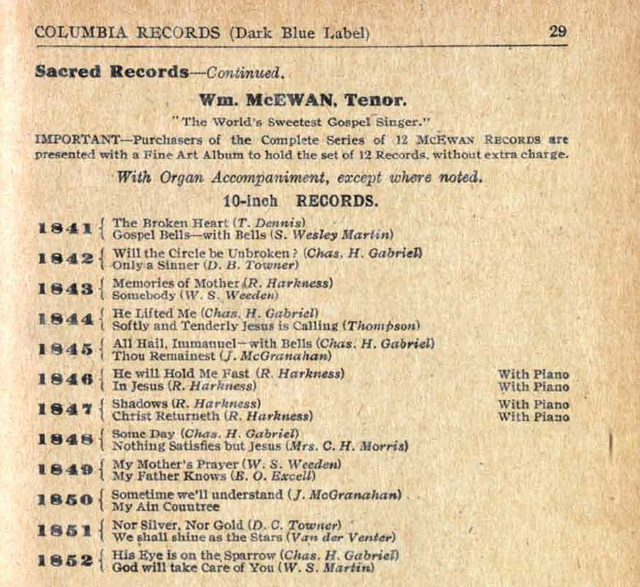
(NB - I have two of the 'fine art albums' mentioned in the catalogue description)
Death of Jeanie McEwan
Another mystery is that the last traces I can find of William’s wife, Jeanie McEwan, are onboard the SS Columbia, arriving in the USA on 18 December 1912, and of course at the birth of Clayton McEwan on 23 October 1914. But by 1920 she had died. In the 1920 US Census William McEwan is recorded as being a 48 year old widower, living with his children Geanie aged 27, William Jr. aged 21, Mary aged 18 and Charles P aged 8 (no mention of Clayton). I do not know if Jeanie McEwan died in the USA or one of the family's many trips back to Scotland.
UPDATED JANUARY 2018: Jeanie died in Brooklyn, New York on 25 July 1919, survived by her husband and four children. The funeral was held at her home, 7 Dwight block, Binghamton.
The Second Recording Session
It was now the “Roaring Twenties”. More than a decade after his first (and so far only) recordings, the 50 year old William McEwan was still in great demand. The advert below is from an Ohio newspaper dated 30th April 1920 – McEwan’s name features here alongside Rodeheaver as well as Al Jolson (once described as ‘The World’s Greatest Entertainer’) and the French Symphony Orchestra.
Columbia arranged for new recording sessions to take place, back in London, in June 1922. But William McEwan would arrive back in Britain as a naturalised US citizen.
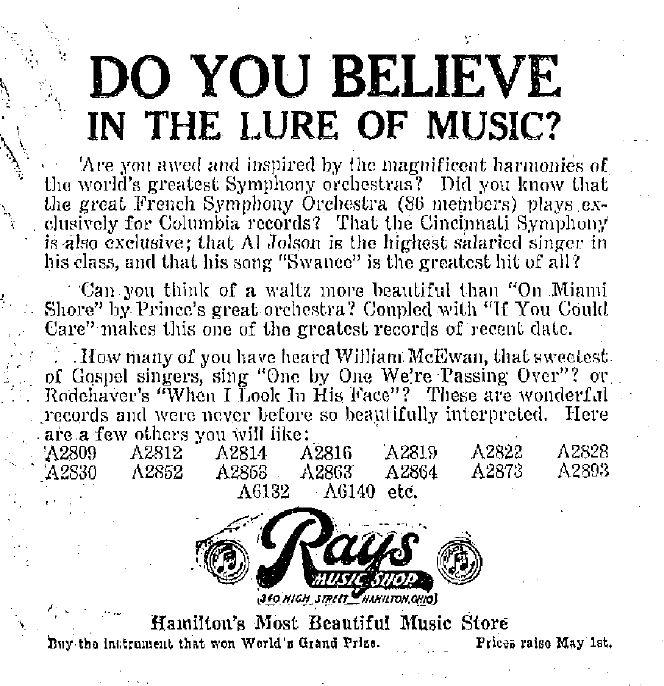
Part Three: Conversion and the historic 1911 London recording sessions
NOW BACK IN GLASGOW, alcohol was still playing a major role in William’s life, much to the concern of his father. It must have been a shock for the devout Covenanters James and Margaret McEwan (both now around 70 years old) to see what had become of their son during his time in America. Here is the only account I have found of William’s condition, and conversion, as reported by a writer with The Daily Republican newspaper of Rushville, Indiana, on 30 October 1912:
“…His father then lived in Scotland, and on one Saturday night he was to appear in a show there, and all his old friends were to turn out to give him a reception. After the show, he said, they all went out for a time. He said he was under the influence of drink when he got home that night and his father was very much put out about it. That night his father extracted a promise from him to attend church the next day.
He started, and met a crowd of his former friends singing on a street corner to attract people to the house of worship. He followed them to the church, but when the invitation was extended he didn’t have the nerve to go forward, he said, because he realized that he would have to break off with all his old life and associates. When the minister said the man who would not hold up his hand signifying that he wanted to be prayed for was a coward, he would not take that and held up his hand. He joined the church, and that night there was great rejoicing in his father’s house.
McEwan said he cancelled all engagements and became an evangelistic singer, and since that time offers had been coming to him and he did not have to seek them…”
The writer, or editor, seems to not understand the nuances of a conversion (conviction of sin > need of a Saviour > Christ as the only answer) and so the account above is a bit disjointed. However, after William’s conversion to Christ, he cancelled all of his musical engagements and took an ordinary job in a carpet factory, on what he later said was just “one tenth of his vaudeville salary”. The famous singer with a blue collar job among ordinary Glasgow folk? Yes. But (as all Christians will know full well) conversion does not mean perfection, and the ‘old nature’ wasn’t too far under the surface. Another newspaper reported that William’s workmates:
“… jollied ‘Mac’ about his religion in the factory and finally he soaked Fisher, one of the foremen, in the face and laid him out, and decided to go back to vaudeville… ”
However,
“…there he believes God intervened, when he was about to slip and instead of going back to vaudeville he drifted into evangelistic singing work and has been at it ever since… ”
A BBC Radio Scotland programme in 2007 said this of MacEwan’s early gospel career on the streets of Glasgow:
“…William MacEwan who used his high penetrating tenor voice to gather a crowd on noisy Glasgow city streets, without the aid of any microphone. They can’t sing like that these days… ”
The late Frank Wappat wrote that:
"...he worked on the premise that 'more people can be reached by singing the gospel than by preaching it'. It is said that his voice could still an angry crowd - and the shrill piercing tenor could certainly penetrate a crowd. To the Saturday night drunks, he would sing 'My mother's prayers have followed me' - often reducing them to tears. Penitents would be led back to his religious Meeting Hall and many there were who professed to having been saved. Indeed, crowds would gather just to hear him sing. His singing style was moulded by appearing in the streets singing to vast crowds before microphones were invented..."
My friend Joe in Ayrshire has told me that his father used to cycle up to Glasgow to listen to William McEwan sing.
The Return to America
The first decade of the 20th century was a formative one for William McEwan. I can find no more details just now of these early post-conversion years in Glasgow, but on 21 November 1908 the ship SS Hesperian left Glasgow carrying a 36 year old evangelist called William McEwan, whose race was stated as ‘Scotch’. The ship docked at Moville in Donegal before arriving in Boston on 4th December 1908. Having spent Christmas in America, in January and February 1909 William McEwan was in Boston with two of the world’s most famous evangelists, John Wilbur Chapman (of Indiana) and Charles McCallon Alexander (of east Tennessee).
[Note: Chapman and Alexander organised revival missions in Britain from February - June 1903, including Edinburgh, Glasgow, Aberdeen and Belfast. See here for a full account. They may well have met William McEwan during this time. Certainly there must have been some connection for William to be whisked across the Atlantic to take part in their US campaigns of 1909]
During the Chapman-Alexander revival campaign William’s role was to lead the singing in ‘Group Five – Roxbury North’ and at Dudley Street Baptist Church. In April McEwan was in Florence, Alabama, and was greeted by The Florence Times report of April 16th with considerable enthusiasm:
“…William McEwan, the noted Gospel soloist who will lead the music in the series of union services to be commenced in the Presbyterian church in this city on the 27th, has had a remarkable career. He was distinguished as an opera singer, and sang in nearly all the large cities of this country and England. He became converted at a gospel meeting in his old home, Glasgow, Scotland, and since then has devoted his rare talents to the work of his Master. A Massachusetts paper in speaking of him says 'William McEwan sings like an opera singer, and this is what he was before he became an evangelist. It is fair to say, too, that no sweeter gospel singer ever lived than this man.' His coming to Florence will be an event indeed…”
November 1909 saw McEwan in the city of Sault Sainte Marie in Michigan, where he worked with New York evangelist Rev Henry Davidson "H.D." Sheldon, an associate of Chapman. A newspaper report of the time said:
“…Mr McEwan will lead the big choir, and will also tell the story of his conversion. This story has interested many in the past, and will doubtless be one of the features to cause the auditorium to be packed on Saturday night… ”
The Evening News of 13 November 1909 reported that:
"...Previous to his conversion Mr McEwan was for seven years an opera singer in the old country... Mr McEwan came to this country a year ago this month after singing the gospel for 12 years in all the principal cities of England, Scotland and Wales. He arrived in Boston in time to assist Dr Chapman in the great campaign in January when he created a wonderful sensation and at once sang his way into the hearts of the people of that city..."
As the Sheldon revival campaign continued, The Decatur Daily Review (Illinois) of 13th February 1910 said that:
“…Mr McEwan is known in many places as ‘The Scotch Sankey’. He has no superior in his line. His voice is a clear tenor, with an unusual range. He sings with a feeling that often brings tears to the eyes of those who hear him. His is listened to with rapt attention…”
Just a few days later, on 19th February, the same paper gave a review of the campaign:
“… the leader of the music, Mr McEwan, won his way with both choir and people. He has a delightful Scotch accent and a warm heart with plenty of the Scotch variety of wit. The people did not sing heartily enough to suit him at first so he admonished them with ‘I am just a common Scotchman; sing, don’t look at me.’ He pleaded that the singing should be full of worship. Mr McEwan has been called the Scotch Sankey. Mr Chapman says that his work is second to none in the field of the singing evangelist…”
In March 1910 he was still in Decatur, Illinois. The Daily Review of March 4 1910 reported that:
“…The service will be conducted by William McEwan who is directing the choir at that church. … by request Mr McEwan will repeat ‘My Ain Country’. As the closing feature of this service, and not the least interesting Mr McEwan will tell the story of his conversion, how he was persuaded to abandon his profession as a singer of light opera and take up religious work as a gospel singer…”
Alongside the article was the notation of McEwan’s self-written hymn “Keep On Praising”. While he was travelling, the family seems to have stayed in Brooklyn, New York City. The 1910 US Census for Brooklyn (dated April 15th) records a traveling evangelist called William McEwan, aged 38, who first came to USA in 1890; his wife Jeanie, aged 38, born Scotland, who first came to USA in 1890; a daughter Jeanie S, aged 17, born in Massachussetts; a son William Jr, aged 11, born in Scotland; and a daughter Mary M, aged 8, born in Scotland.
As the year went on, his popularity soared. On 24th October 1910 The Paducah Evening Sun of Kentucky headlined an article as “Greatest Crowd Attends Revival on Sunday Night - Mr William McEwan sang two songs”.
In December 1910 McEwan was with famous evangelist Dr Reuben Torrey (a colleague of DL Moody, and who had been in Britain with Chapman & Alexander back in 1903), assisting with the music in a revival campaign at Saint John in New Brunswick, Canada. Thousands attended the campaign. They then moved to a three week mission in January 1911 in Windsor, Nova Scotia – crowds as large as 1200 people flocked to the meetings. The Boston Daily Globe reported on 6 February 1911: "...he was assisted by William MacEwan , tenor soloist, who was in Boston with Chapman and Alexander two years ago, and is now associated with Rev Dr R A Torrey…”
So from December 1908 – February 1911, William McEwan made an astonishing impact upon the evangelical world in the United States, singing in at least 6 states, and also in Canada. He was now a musical phenomenon, and just the man whose voice should be captured by the latest in audio technology. William McEwan was bound for London to record his singing for the iPod of its day, the new wind-up 'talking machine' gramophone.
The first recording session
In November 1911, while Chapman and Alexander were conducting a revival mission in Bangor, County Down, William McEwan travelled to London.The Columbia Phonograph Company had opened an office in London in 1900, initially in a five storey building at 122 Oxford Street but later moved to larger premises at 89 Great Eastern Street. They built a disc factory at Bendon Valley, Wandsworth in 1906 to manufacture both records and record players.
Louis Sterling became manager of Columbia (London) in 1909; his strategy for the label was that "they got hold of some of the best voices and instrumentalists in the kingdom and their productions had a great vogue..." (from The Talking Machine Industry by Ogilvie Mitchell, 1924). It is said that by 1913 one third of British households owned a gramophone.
The inlay card for the 1994 Lismor CD sampler ‘William MacEwan – the Original Glasgow Street Singer-Evangelist’ tells the story like this:
“…In 1911 he traveled to London to persuade the Columbia-Rena Record Company to record him singing gospel songs for the working class people. Such were his powers of persuasion that the surprised, but convinced, record company signed him up to record 24 gospel songs at his first session shortly afterwards. With only harmonium for accompaniment, this amazing Scotsman made the world’s first set of gospel songs using the primitive recording apparatus of the day. Microphones had not been invented, so the recordings were made by MacEwan singing into a tin horn attached to which was a rubber tube leading to a cutting needle, etching his voice into a 3/4" thick warmed platter of wax. The harmonium was housed on a platform four feet above the ground and placed near the recording horn…”
The 24 songs were as follows:
Gospel Bells
(Martin / Sankey - written 1895) Issue No 1841
He Died of A Broken Heart
(Dennis / McKinney - written early 1900s) Issue No 1841
Will the Circle Be Unbroken
(Habershon / Gabriel - written 1907) Issue No 1842
Only A Sinner
(Gray / Towner - written 1905) Issue No 1842
Memories of Mother
(Morris / Harkness - written 1910) Issue No 1843
Somebody (Did a Golden Deed)
(John R Clements / W.S. Weeden - written 1901) Issue No 1843
He Lifted Me
(Gabriel - written 1905) Issue No 1844
Softly & Tenderly
(Will L Thompson - written 1880) Issue No 1844
All Hail Emmanuel
(Van Sickle / Gabriel - written 1910) Issue No 1845
Thou Remainest
(Whittle / McGranahan - written 1884) Issue No 1845
He Will Hold Me Fast
(Habershon / Harkness - written 1906) Issue No 1846
In Jesus
(Procter / Harkness - written 1903) Issue No 1846
Shadows
(Harkness - written 1906) Issue No 1847
Christ Returneth
(Turner / McGranahan - written 1906) Issue No 1847
Some Day
(Staley / Gabriel - written 1911) Issue No 1848
Nothing Satisfies but Jesus
(Morris - written 1905) Issue No 1848
My Father Knows
(Henry / Martin - written 1897) Issue No 1849
My Mother’s Prayer
(J.W. Van de Venter - written 1895) Issue No 1849
My Ain Countrie
(Demarest - written 1861) Issue No 1850
Sometime We’ll Understand
(Cornelius/McGranahan - written 1891) Issue No 1850
We Shall Shine as Stars
(J.W. Van de Venter - written 1899) Issue No 1851
Nor Silver Nor Gold
(Gray / Towner - written 1900) Issue No 1851
God Will Take Care of You
(Martin / Martin - written 1905) Issue No 1852
His Eye is On the Sparrow
(Martin / Gabriel - written 1905) Issue No 1852
Looking back on this track listing exactly 100 years later, to us these are all old, old songs which many readers here will have been familiar with from childhood - if not from McEwan’s original recordings then certainly from other versions recorded later in the 20th century by other gospel singers, or from popular hymnbooks. But in 1911, most of these were fresh, new pieces, written by people who were the Stuart Townends and Keith Gettys of that era. The oldest by quite some distance is the Scots language hymn ‘My Ain Countrie’, which had become something of a signature piece for William McEwan. It's also important to remember that 'popular hymns' were a relatively recent phenomenon, and not without controversy (as the life of hymnwriter Horatius Bonar demonstrates). It was the 1859 revivals in Scotland, Ulster and America that transformed the world of sacred song.
This set of recordings gave McEwan the title of “The World’s First Great Gospel Singer on Record”, and led Columbia to market him as “The World’s Sweetest Gospel Singer”. With the recording completed the 5' 2" McEwan went back to America, sailing on the SS Baltic from Liverpool on 20th December 1911 and arriving in New York on 7th January. He became a megastar.
“…William McEwan is held to be the first gospel tenor in America. In the advertisement of the Columbia Phonograph Co, who have the exclusive right to the records produced from his voice, he is called the world’s sweetest gospel singer… about four years ago he came to this country, where he has become loved as well as famed, for his quaint Scotch ways, his devout piety and pleasant face, as well as a lovely voice…”
- from The Hamilton Daily Republican (Ohio) 29 November 1912
America was now William McEwan's oyster. But war was coming...








